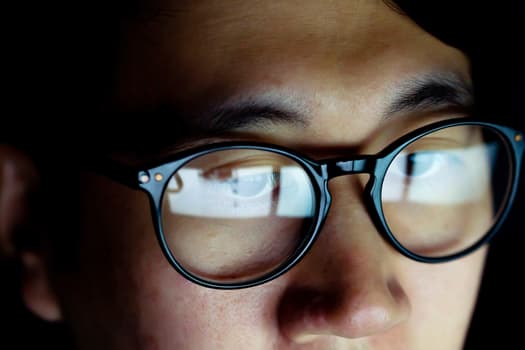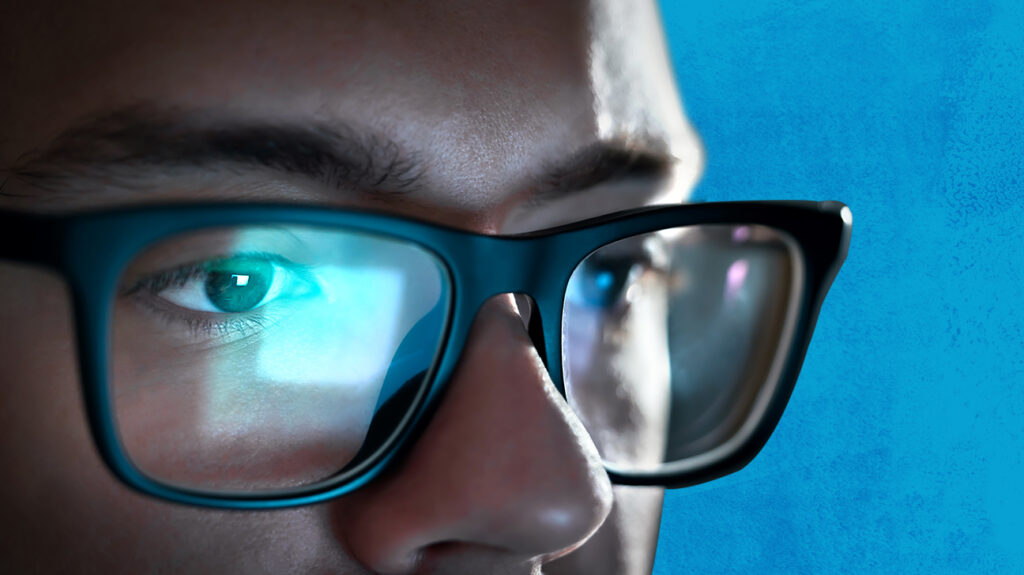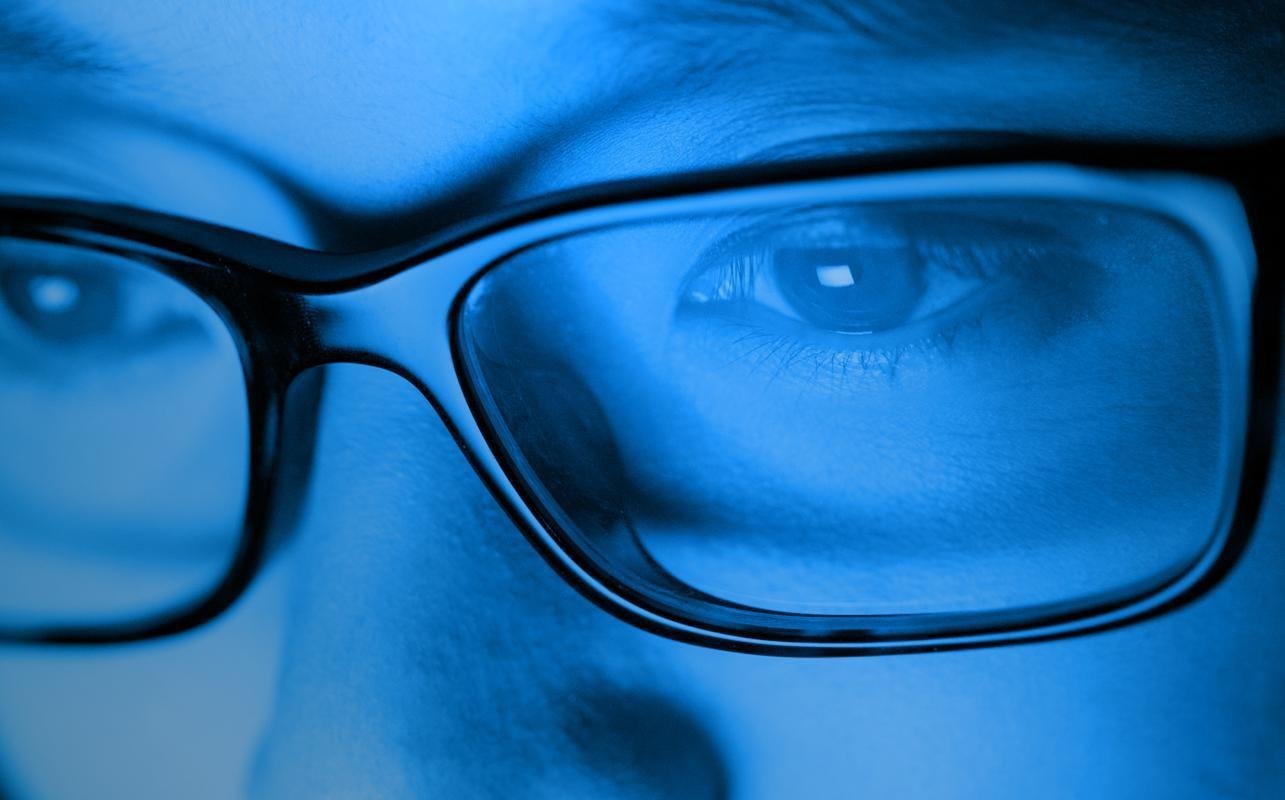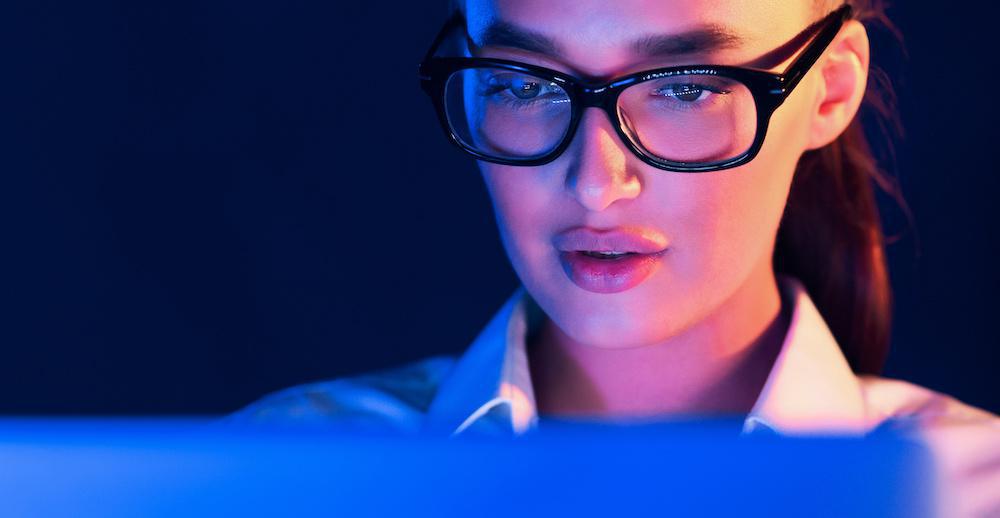Hello!
Although having a mobile device means being able to send a message, update your social media accounts, view photos, watch videos, and search for something online anytime and anywhere you want, these activities can take a toll on your well-being, particularly on your eye health.
Mobile phones, tablets, and computer and laptop monitors are the leading sources of blue light. Blue light is light with blue wavelengths that are said to be beneficial during the day since they can enhance a person’s focus, reaction times, and mood.
However, since blue light essentially helps keep you awake, it can be harmful at night because it can impede sleep.
 When you stare at a screen continuously for hours, you are exposed to blue light emitted by the electronic screen.
When you stare at a screen continuously for hours, you are exposed to blue light emitted by the electronic screen.
LEDs and fluorescent light are also common sources of blue light.
The combination of all these pieces of technology means that nearly everyone is exposed to unhealthy amounts of blue light, especially those not wearing computer protective glasses.
Reasons to Wear Computer Protective Glasses
Also known as computer protective glasses, blue light blocking eyewear has specially designed lenses that can block or filter out the blue light that phone screens, laptop or computer screens, and other gadgets emit.
These specially designed glasses help protect your eyes from the harmful effects of constant exposure to blue light.
But what are the exact benefits of wearing computer glasses?
Below are the top five:
1. Allows you to experience better sleep at night.
One of the negative effects of constant blue light exposure is that it can affect your normal waking and sleeping cycle.
Exposure to any type of light, including blue light, in the evening can impede your body’s melatonin production.
Melatonin is a hormone that helps regulate your body’s circadian rhythm and synchronize your sleep-wake cycle with night and day.
 Aside from affecting your body’s melatonin production, blue light can throw off your natural body clock. This is because your brain will likely associate blue light with daytime, thus making it hard for you to fall asleep at night and wake up in the morning at the right times.
Aside from affecting your body’s melatonin production, blue light can throw off your natural body clock. This is because your brain will likely associate blue light with daytime, thus making it hard for you to fall asleep at night and wake up in the morning at the right times.
You can minimize this effect by avoiding any screen time at least 30 minutes before sleeping.
However, if you can’t do this, putting on computer protective glasses as you use your smartphone or tablet before going to sleep can help reduce the effects of blue light exposure on your body.
2. Lowers your risk of eye diseases.
High levels of blue light exposure can increase your risk of macular degeneration and other eye diseases, including cataracts, in the future.
This is because blue light penetrates through the cornea to the retina. In the process, the light damages the light-sensitive cells in the retina.
Although your cornea and eye lens can block harmful UV light from reaching the retina, they can’t block blue light.
Wearing computer protective glasses can help you minimize the harmful effects of constant exposure to blue light, allowing you to reduce your risk of eye diseases.
3. Reduces eye strain.
Blue light tends to disperse quicker than other types of visible light. Because of this, it lowers contrast and makes it hard for your eyes to focus, which can contribute to digital eye strain (DES) or computer vision syndrome (CVS).
The common symptoms of digital eye strain include blurred vision, headaches, and neck pain.
 You can avoid this condition by wearing blue light-blocking glasses. The lenses of this specialized eyewear can filter out blue light and increase contrast, making it easier for you to focus and subsequently reduce eye strain.
You can avoid this condition by wearing blue light-blocking glasses. The lenses of this specialized eyewear can filter out blue light and increase contrast, making it easier for you to focus and subsequently reduce eye strain.
If you want to increase your comfort level when viewing digital devices for long periods, consider getting computer protective glasses with yellow-tinted lenses.
4. Lessens frequency of headaches.
As mentioned, headaches are frequent symptoms of DES or CVS.
 Aside from the recurring pain in your head, blue light-induced headaches are accompanied by:
Aside from the recurring pain in your head, blue light-induced headaches are accompanied by:
- Tension in the face, neck, and shoulder muscles
- Blurry vision
- Burning, stinging, and itchy eyes
- Increased sensitivity to light
Prolonged exposure to blue light can also trigger and aggravate migraine attacks.
Wearing computer glasses helps block blue light, which can reduce headaches, headache pain, and migraine attacks.
5. Allows you to use your devices longer without worries.
Since many of your daily activities now call for the use of your smartphone, tablet, or computer, you are likely glued to your screen for hours every day. Because of this, you are constantly bombarded by the blue light these devices emit.
You can continue using your devices as usual with lower health risks by wearing computer protective glasses.
With your blue light glasses, you can protect your eyes without worrying about increasing your risk for potential vision issues.
Getting your children computer glasses is also one way of helping them maintain their eye health. With kids and teens also using technology for learning, you can protect their vision by having them wear blue light blocking eyepieces whenever they use their computers and mobile devices.
Also read:
- Strawberry Browser: The AI-Powered Browser That’s a Total “Wow!”
- 7 Best Website Development Tool to Consider in 2025
- Europe Tightens Crypto Control with New AMLA Rules!
Other Ways to Reduce the Effects of Constant Blue Light Exposure
 Aside from wearing the right computer protective glasses, below are some additional ways you can minimize the unhealthy effects of constant exposure to blue light:
Aside from wearing the right computer protective glasses, below are some additional ways you can minimize the unhealthy effects of constant exposure to blue light:
- Wear sunglasses when going outdoors. Computer glasses won’t give your eyes sufficient protection from the glare, UV rays, and blue light proliferating outside, particularly during the hottest parts of the day. As such, put on a pair of shades when spending time outdoors.
- Modify your lighting. If you are using white LED bulbs in your home, replace them with blue light-free ones. If you can’t change them, get additional fixtures that do not use LED bulbs, especially in your bedroom.
- Use laptop and computer monitor screen filters. Purchase and install screen filters on your laptop or computer monitor or enable this feature on your device (if it has one) to lower your exposure to blue light.
- Position yourself at an arm’s length away from your screen. Minimize your exposure to blue light when using your laptop or computer by sitting at least 20 inches (your arms’ length) away from the monitor.
- Follow the 20-20-20 rule. Whether you are using a mobile device, or your laptop or computer, look at an item at least 20 feet away from you for 20 seconds every 20 minutes. Doing so allows you to give your eyes a break and reduce eye strain.
Aside from wearing computer glasses, keep in mind that the best way to reduce your exposure to blue light is by limiting the time you spend looking at devices and being subjected to artificial lighting that emits this type of light.
Doing so can help you maintain good eye health and keep vision-related issues at bay.
Thank you!






